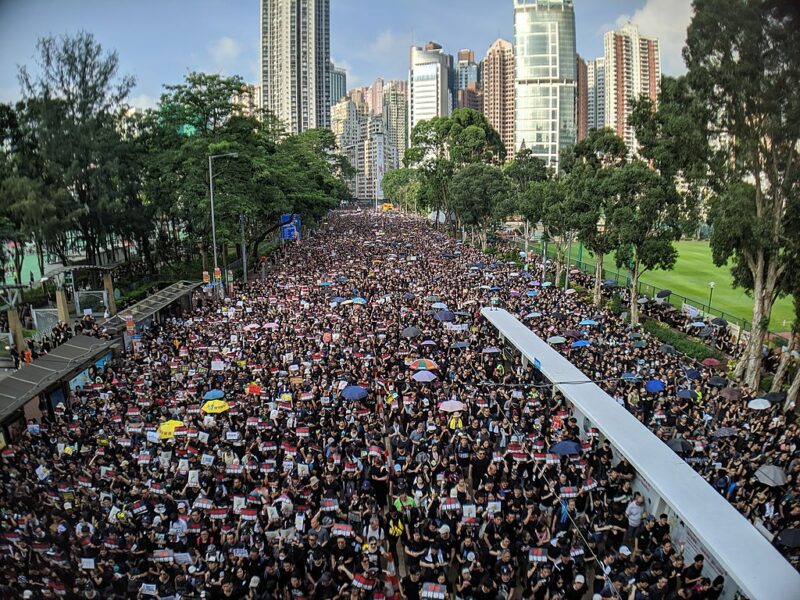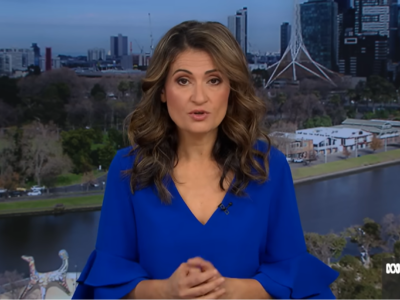
2019 Hong Kong anti-extradition law protest on 16 June. Image by Studio Incendo, via Wikimedia Commons. Used under a CC BY 2.0 license.
A new wave of crackdowns by Hong Kong authorities to suppress dissent by activists living overseas has renewed media coverage of human rights in the former British colony. In an apparent own goal, the harsh treatment of opposition has come under the spotlight once again.
#HongKong has issued arrest warrants for eight activists now living the US, UK or Australia. Some of them are ex-lawmakers, or are members – or founding members of – lobbying groups based abroad. In full: https://t.co/LxIHQZoFCB pic.twitter.com/7Eb8AfSBrV
— Hong Kong Free Press HKFP (@hkfp) July 3, 2023
Arrest warrants and bounties of HKD 1 million (USD 130,000) were issued for eight pro-democracy exiles. The eight are wanted over alleged collusion with foreign countries because they lobbied foreign governments to impose sanctions against local officials. The Hong Kong police cited National Security Law Article 37 and stressed that it had extraterritorial jurisdiction and the responsibility to pursue individuals based overseas who committed acts endangering the city’s national security.
Since the eight no longer live in Hong Kong, and their acts are completely legal in their hosting countries, Hong Kong's extraterritorial jurisdiction claim has invited diplomatic protests. The U.S. government, for example, condemned Hong Kong and warned that “The extraterritorial application of the Beijing-imposed National Security Law is a dangerous precedent that threatens the human rights and fundamental freedoms of people all over the world.”
The crackdowns have certainly not silenced or intimidated the exiles. Quite the opposite. However, other Hong Kongers residing overseas may be fearful. If they say something or attend protests overseas, when they came back to Hong Kong, they might be prosecuted. For example, in April 2023 a student living in Japan was arrested in Hong Kong for a Facebook post allegedly “inciting secession.”
The eight accused are Australian lawyer and legal scholar Kevin Yam, Australian resident and former Hong Kong Democracy party MP Ted Hui, Nathan Law, Anna Kwok, Finn Lau, former MP Dennis Kwok, unionist Mung Siu-tat, and online commentator Yuen Gong-yi.
Yam is an Australian citizen, whilst Hui is on a temporary bridging visa. The remaining six live in various countries including the United states and the United Kingdom.
The controversy has put the relationship between Australia and China under pressure. The Australian Labor government has been trying to reset relations since coming to power in May 2022.
The previous conservative Liberal/National coalition government had seen tensions with Beijing growing for some time, before hitting rock bottom in 2020 following its call for an independent investigation of COVID-19 origins. Contact between government ministers has ceased. Prime Minister Anthony Albanese plans to visit China later this year but there have been some calls for him not to go. He has commented on the latest development:
I am of course disappointed. I've said we'll cooperate with China where we can. But we will disagree where we must…
Rather than oppose Albanese's visit, Kevin Yam has taken a balanced position on Australia’s dealings with China, instead calling on Victorian Labor MPs to abandon what he calls a “propaganda trip.”
“I’m not some sort of extremist who says you should never deal with China.”
With this, and as a @VictorianLabor @AustralianLabor member, I support @AlboMP heading to Beijing BUT not the Vic MPs’ trip. I explain why in this report. https://t.co/A0gVFWf7Qt
— Kevin Yam 任建峰 (@kevinkfyam) July 7, 2023
Anna Kwok is executive director of the Hong Kong Democracy Council and the only woman among the eight dissidents targeted. She is currently based in Washington D.C. She shared her first reaction to the news with BBC News, but not all the responses were supportive:
Bounty for information?!…reward for information you mean.
As someone living in HK, I’m glad the HK police finally did this…these 8 will never dare set foot in HK again. They do more damage to our society when they are here. The riots were proof of that.
— Gus the Bus (@Rebecca3745091) July 4, 2023
Meanwhile, back in Hong Kong, chief executive John Lee seemed determined to intimidate the eight exiles:
John Lee, the chief executive of Hong Kong, wants exiled dissidents to “live in fear.”
He has set up a retribution system to enable the arrests of eight activists, including Nathan Law, Ted Hui and Dennis Kwok.
By @LemaitreFrederi: https://t.co/lwFBoQR4rd
— Le Monde in English (@LeMonde_EN) July 5, 2023
Ted Hui is clearly not hiding in fear, according to an SBS News report:
I will continue to live an ordinary, normal life while I continue my advocacy work for freedom and democracy in Hong Kong.
For example, I'll still meet parliamentarians, and government officials, human rights groups, and all the Hong Konger communities in Australia and to unite them so that we are together, and to get stronger.
Perhaps this latest move is as much about intimidating and repressing people in Hong Kong itself, mainland pro-democracy sympathisers and the large overseas diaspora, than seriously hunting the eight activists. Academic Brendan Clift analysed the wider implications at The Conversation:
Hong Kong’s civil society has been brought to heel via a suite of repressive reforms spanning the legal, political, education and media sectors. These new warrants are the latest sign that China will never stop trying to muzzle its critics, so long as they are willing to speak out.
Ultimately, these warrants may be futile overreach – for the sake of their targets, we can only hope that is so – but the intention behind them remains condemnable. They are a threat to freedoms that lie at the core of our democratic society.
Recent developments strengthen Clift's opinion. In breaking news, Hong Kong Free Press claimed authorities have acted to suppress local pro-democracy advocates. In addition, Hong Kong Free Press reported that a supportive app has also been removed:
An app that promoted businesses sympathetic to Hong Kong’s 2019 protests appeared to have vanished from online platforms and app stores in the city, after local media reported that five people arrested by national security police on Wednesday and Thursday were linked to its operations.
The translation of 懲罰Mee is Punish Me, a humorous reference to the 2019 protests that has now taken on a far more serious meaning.
Apparently, four of the men have been released on bail, with the whereabouts of a fifth man detained at the airport unknown.
Anouk Wear of Hong Kong Watch summed up on Twitter:
HK arrest fifth pro-democracy person on #NSL charges today, picking him up at the airport
Trying to spread fear at home, abroad, and travelling in between
Further incentive to fight for the #rights, #freedom, and #democracy that we deserve✊
— Anouk Wear 華穆清 (@anoukwear) July 6, 2023



